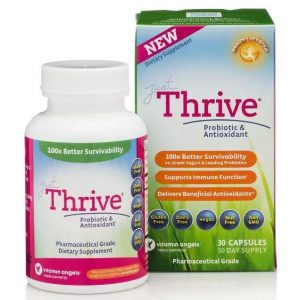
Do you have ‘Corona Brain?’ You just might and don’t know you do!
As the body’s gut-brain connection is better understood, inflammation in the brain can now be studied from several different perspectives — including the role the gut may play in helping to manage it.
Research confirms: SARS-CoV-2 infection remains in the brain
Meet the probiotic powerful enough to reach your gut intact — and capable enough to produce essential antioxidants while upregulating immunity to help ward off bacterial and viral infections.1
In a recent study, Chinese researchers reported that a significant number of COVID-19 patients had neurologic symptoms, with over 45 percent of cases considered severe.2 Studies conducted by French and German scientists also confirmed high percentages of patients who had similar neurological infections.3
No direct evidence of SARS-CoV-2 infection (the virus responsible for COVID-19) was found in the human central nervous system (CNS). However, though the COVID-19 SARS virus may have run its course, it may have activated other infections in the body and the brain as a significant number of patients are experiencing lingering infections in the brain that affect neural progenitor cells.
To assess the possible infection of SARS-CoV-2 in brain tissue:
- Scientists created an artificial model of a brain organelle called a brain “organoid,” using specific types of stem cells.
- They also created a neurosphere, a culture system composed of clusters of neural stem cells.
- Neurospheres are a simulated environment containing different types of cells, added to a culture, that can easily be studied by scientists.
The research team then assessed SARS-CoV-2 infection in the neurospheres, brain organoids, and human neural progenitor cells. Results demonstrated that SARS-CoV-2 could produce infection in the human brain.
While COVID-19 is known as a respiratory illness, neurological symptoms, including headache, anosmia (the loss of the sense of smell), ageusia (the loss of the sense of taste), confusion, seizure, and encephalopathy (damage or disease affecting the brain), have also been reported in patients. These symptoms tend to be associated with inflammation in the brain.
Researchers suggested that chronic and long-term consequences of SARS-CoV-2 infection of the central nervous system should be closely monitored. Based on information you’re about to learn, so-called COVID long haulers who never feel right after getting COVID-19 (aside from being monitored) also need to be treated. We’d like to offer some suggestions, so please read on.
Follow us for more of the latest gut health news in your feed.
What happens when your central nervous system becomes inflamed?
Taking a closer look at inflammation in the central nervous system, the CNS contains three main types of differentiated cells:
1. Neurons – Highly specialized nerve cells responsible for communicating both chemical and electrical information.
2. Oligodendrocytes – Cells responsible for producing a fatty protein called myelin; this insulates axons, the long extensions of nerve cells (neurons), and allows them to transmit nerve signals faster than unmyelinated cells.
3. Astrocytes – Star-shaped cells in the brain and spinal cord having multiple functions, including supplying nutrients to the nervous tissue and playing a role in repairing the brain and/or spinal cord when an injury has been sustained or an infection suffered; they also provide needed support for the scarring process.
Note: You might want to read that last paragraph again — about astrocytes. Recent research reveals that specific astrocytes may also promote neurodegeneration, inflammation, and neurological diseases instead of serving as a protective, anti-inflammatory function within the brain. And guess what? These specific astrocytes rely on communication with gut bacteria.4
Using analytic tools, the researchers identified the specific astrocytes. Most astrocyte cells lie close to the meninges (the membrane enclosing the brain) and introduce two proteins that kill T-cells that promote inflammation.
So, what controls the two proteins responsible for limiting brain inflammation? The researchers performed a series of tests and found that the signaling molecule, interferon-gamma, regulates the expression of a protein called TRAIL.
They also found that the gut microbiome prompts the expression of interferon-gamma in cells that circulate throughout the body and ultimately reach the meninges. Once there, they can promote this anti-inflammatory response in these specific astrocytes.
Understanding what drives the anti-inflammatory functions of these specialized astrocytes could enable researchers to develop therapeutic approaches to combat neurological diseases, like multiple sclerosis. If you’ve been following Body Ecology for a while, might you already suspect a therapeutic approach?
Simple strategies anyone can use to address Corona Brain & support healing
One strategy being considered is utilizing probiotics to regulate the astrocytes’ anti-inflammatory activity. “Finding microbiome-controlled anti-inflammatory astrocytes is an important advance in our understanding of Central Nervous System inflammation and its regulation. This is a very novel mechanism by which the gut controls inflammation in the brain,” reported the lead scientist in the Nature study mentioned above.4
Beneficial microbes in your diet can help support a healthy microbiome. As research is showing, gut microbes help regulate the inflammatory response in the brain.4 Organic vegetables and fruits, versus vegetables and fruits sprayed with pesticides, do have some beneficial microbes.
But even more potent are fermented vegetables.
Also, milk and coconut kefirs are simple and easy to make at home and provide a richer source of beneficial bacteria and yeast than store-bought yogurt and kefir. If you’re pressed for time, drinking one of our probiotic power shots and mixers each day, like InnergyBiotic, can supply the same benefits. Refreshing and energizing, InnergyBiotic is teeming with friendly microbes that support digestion and immunity — helping to fight inflammation.
Furthermore, it appears that the brain receives protection from infection thanks to immune cells found in the gut. These cells can recognize and respond to pathogens — which then appear to move to the brain’s surface to protect it, according to a study conducted with mice in the journal Nature.5
Our bodies produce antibodies known as immunoglobulin A (IgA). These are found in the middle layer of the gut lining. The IgA protect against pathogens that make their way into your body.
Researchers learned that cells that produce IgA in the membrane that encloses the brain originated in the intestines. To investigate further, scientists introduced Candida albicans, a pathogenic fungus, into the mice’s bloodstream to assess results in the brain. They determined that IgA antibodies appeared in the meninges to attack the pathogen and protect the brain.
This is another way bacterium in the gut microbiome has been shown to help fight inflammation in the brain.
For a healthy gut and brain, it can help to support the immune system and healthy levels of secretory IgA (IgA in its secreted form) by:
- Consuming prebiotic and probiotic-rich foods, such as fermented foods, to help create a diverse and robust microbiome. Along with cultured vegetables, apple cider vinegar, kimchi, and unpasteurized miso are good dietary sources.
- Supplementing with Just Thrive, a probiotic/antioxidant. It contains a bacterial strain called Bacillus indicus HU36 — a strain able to make protective carotenoids in the small intestine, which have been found to strengthen the immune system and overall health.6
- Reducing stress through meditation, exercise, playing with pets, getting enough sleep, and spending time with friends, etc.
- Integrating other suggested supplements to help calm brain inflammation. A new and novel form of curcumin made by Longvida helps protect the brain.7 It’s a “brain curcumin.” Longvida’s curcumin, along with regular curcumin, has proven anti-inflammatory effects.8 Likewise, magnesium is now being recognized as a mineral essential to sustaining the brain’s synaptic structures. The issue lies in ensuring ample magnesium reaches the brain. Magnesium threonate’s special ability to permeate the blood-brain barrier solves this problem, while also providing anti-aging benefits; this form of magnesium, created by researchers from MIT, is powerful enough to reverse brain aging by almost a decade.9
With the advent of COVID-19, inflammation in the brain has become a bigger concern than ever before. But the good news is that promoting and reinforcing gut health using the strategies above can be a great defense for your brain.
REFERENCES:
- 1. Urdaci MC, Bressollier P, Pinchuk I. Bacillus clausii probiotic strains: antimicrobial and immunomodulatory activities. J Clin Gastroenterol. 2004 Jul;38(6 Suppl):S86-90. PubMed PMID: 15220667.
- 2. Zhang, BZ., Chu, H., Han, S. et al. SARS-CoV-2 infects human neural progenitor cells and brain organoids. Cell Res 30, 928–931 (2020). https://doi.org/10.1038/s41422-020-0390-x.
- 3. Garrigues E, Janvier P, Kherabi Y, et al. Post-discharge persistent symptoms and health-related quality of life after hospitalization for COVID-19. J Infect. 2020;81(6):e4-e6. doi:10.1016/j.jinf.2020.08.029.
- 4. Sanmarco, L.M., Wheeler, M.A., Gutiérrez-Vázquez, C. et al. Gut-licensed IFNγ+ NK cells drive LAMP1+TRAIL+ anti-inflammatory astrocytes. Nature 590, 473–479 (2021). https://doi.org/10.1038/s41586-020-03116-4.
- 5. Fitzpatrick Z, Frazer G, Ferro A, Clare S, Bouladoux N, Ferdinand J, Tuong ZK, Negro-Demontel ML, Kumar N, Suchanek O, Tajsic T, Harcourt K, Scott K, Bashford-Rogers R, Helmy A, Reich DS, Belkaid Y, Lawley TD, McGavern DB, Clatworthy MR. Gut-educated IgA plasma cells defend the meningeal venous sinuses. Nature. 2020 Nov;587(7834):472-476. doi: 10.1038/s41586-020-2886-4. Epub 2020 Nov 4. PMID: 33149302; PMCID: PMC7748383.
- 6. Sy C, Dangles O, Borel P, Caris-Veyrat C. Interactions between Carotenoids from Marine Bacteria and Other Micronutrients: Impact on Stability and Antioxidant Activity. Mar Drugs. 2015;13(11):7020-7039. Published 2015 Nov 19. doi:10.3390/md13117020.
- 7. Scholey A et al. Curcumin improves hippocampal function in healthy older adults: A three month randomized controlled trial. Poster Presentation in: 13th European Nutrition Conference – Malnutrition in an Obese World: European Perspectives (FENS). Dublin, Ireland. 2019: P3-01-02.
- 8. McFarlin BK, Venable AS, Henning AL, et al. Reduced inflammatory and muscle damage biomarkers following oral supplementation with bioavailable curcumin. BBA Clin. 2016;5:72-78. Published 2016 Feb 18. doi:10.1016/j.bbacli.2016.02.003.
- 9. Liu G, Weinger JG, Lu ZL, et al. Efficacy and Safety of MMFS-01, a Synapse Density Enhancer, for Treating Cognitive Impairment in Older Adults: A Randomized, Double-Blind, Placebo-Controlled Trial. J Alzheimers Dis. 2016;49(4):971-90.









